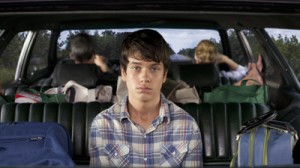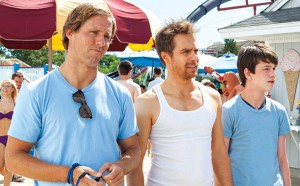Laggies
Posted on October 30, 2014 at 5:58 pm
B+| Lowest Recommended Age: | Mature High Schooler |
| MPAA Rating: | Rated R for language, some sexual material and teen partying |
| Profanity: | Strong and crude language |
| Alcohol/ Drugs: | Adult and teen drinking and drunkenness, drunk driving |
| Violence/ Scariness: | Car crash, tense emotional confrontations |
| Diversity Issues: | None |
| Date Released to Theaters: | October 31, 2014 |
| Amazon.com ASIN: | B00OUNNWPS |
Lynn Shelton is known for writing and directing small, intimate, independent films with a lot of improvised dialogue (“Humpday,””My Sister’s Sister,” “Touchy Feely”), often using the same small group of actors. With “Laggies,” she moves seamlessly to working with a more conventional screenplay, written by someone else (novelist Andrea Seigel), and with a higher-profile Hollywood cast, but the film maintains a nice indie sensibility that lets the characters speak for themselves. For example, the only time the word “laggie” is used, it is not directed at any of the main characters and it is never explained, but we get the point. The laggie is Megan (Keira Knightley), who has lagged behind her close-knit group of friends from high school. Ten years later, all of them are established in careers and relationships. You can tell they all have mortgages and 401(k)s. But Megan, who has an MA in counseling, is currently working as a “sign girl” for her accountant father (Jeff Garlin), standing on the sidewalk twirling an arrow sign advertising his firm. She is living with Anthony (Mark Webber), the boyfriend she has been with since sophomore year of high school.
At a bridal shower for her friend Allison (Ellie Kemper), her friends find her joking immature and she finds them stuffy. And at Allison’s wedding (with a hilariously pretentious First Dance), two developments shake Megan badly. Anthony proposes. And Megan sees her father kissing (and more) Allison’s mother. Megan leaves the wedding and meets four teenagers hanging out in front of a convenience store. They ask her to buy some booze for them and she reasons that since someone did it for her, she should do it for them. “It’s a rite of passage,” she reassures herself.
With no interest in returning to her messy life, she spends some time with the kids. They think she is cool, and she likes being thought of that way. Annika (Chloë Grace Moretz) gives her a phone and asks her to stay in touch. When Megan gets back to her apartment, she accepts Anthony’s proposal and agrees to elope with him in a week. Before they go, she tells him, she wants to attend the week-long personal development seminar that made such a difference to him (he learned that his spirit animal was a shark and that made him realize he had to start making decisions in his life because if a shark doesn’t move, it dies).
She has no intention of attending the seminar. She just needs time to think. And then Annika calls and asks her to pretend to be her mother for a parent conference at school. Megan puts up her hair and fakes her way through. And then she asks Annika if she can stay at her house for a week without her father finding out. One of the many nice touches in this movie is that of course he finds out immediately. This is not a sitcom. The set-up may be artificial, but the characters have real-life reactions.
Annika’s father is Craig (Sam Rockwell), a divorce lawyer and single dad. Annika’s mother left them years ago and he spends his days working with unhappy, angry couples. Annika thought she could hide Megan because Sam was supposed to be at a mixer, but he comes home early. I loved the detail that his name tag was on his arm and his conversation with Megan about how women at mixers like that tap him on the arm to show that they are listening. There are lies, and excruciating confessions, and lessons learned, but the progress is organic as everyone from the school counselor who thinks Megan is Annika’s mother to the real mother (the always-excellent Gretchen Moll) to Megan’s old friends from high school and even Craig seem to be carrying a message about growing up even though you don’t have it all figured out. Shelton has enough confidence in the story, the characters, and her outstanding performers to avoid the easy exaggerations of the genre and show us real people who are essentially decent struggling to find the courage to move forward, even when they don’t know where that will take them.
Parents should know that this film includes strong language, drinking by adults and teenagers, drunk driving, car crash, sexual references, some crude, and non-explicit situations, and infidelity.
Family discussion: What animal would you pick to represent your spirit? How can you tell when you’ve outgrown your friends?
If you like this, try: “Girl Most Likely” and Sam Rockwell films like “Galaxy Quest” and “The Way Way Back”


